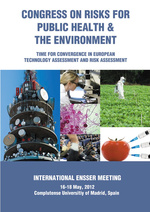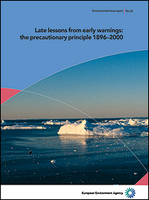Time for Convergence in European Technology Assessment and Risk Assessment
May 16-18, 2012 – Madrid/Spain – Complutense University
Co-organisers: ENSSER, EEA, Fundación Vivosano/Health Defense Organisation, Cátedra Universidad-Empresa-Sindicato: Trabajo, Ambiente y Salud
May 16 (13:30) – Opening
Prof. Emilio Mínguez Torres, Vice-Rector, Technical University of Madrid, Spain
Prof. Antonio Notario Gómez, Director, School of Forestry Engineering, Technical University of Madrid, Spain
Irina Rodriguez de la Flor, Director, Fundación Vivo Sano/Health Defense Organisation, Spain
Dr. Hartmut Meyer, Coordinator, ENSSER, Germany
Roundup Ready Agriculture in Argentina
May 16 (14:00) Analysing the “Package” of GE Soybean Production, Pesticide Use and Export Commodities
(Moderator: Hartmut Meyer)
Inherent logic of herbicide tolerant GE crops and bad policy choices
Dr. Angelika Hilbeck, Chairperson of ENSSER, Switzerland
(view the video stream)
Ecological and economic implications after 15 years of transgenic soybean in the River Plate Basin
Dr. Ana Carolina Herrero, National University of General Sarmiento, Argentina
(view the video stream)
Health Implications of glyphosate and pesticide dominated agriculture: Medical aspects
Prof. Andres Carrasco, University of Buenos Aires, Argentina
(view the video stream)
Health implications of Roundup and requirements for health safety testing of HR crop plants: Molecular and biosafety aspects
Nicolas Defarge, University of Caen, France
(view the video stream)
May 16 (16:30) – Panel Discussion
(Moderator: Irina Rodriguez de la Flor)
Simon Birkett, CEO, Campaign for Clean Air in London, UK
Dr. Henry Dahl, Inter-American Bar Foundation, USA
Dr. David Quist, GenØk – Centre for Biosafety, Norway
(view the video stream)
May 16 (18:30 – 20:00) – Discussion & Conclusions
Christine von Weizsäcker, ECOROPA, Germany
(view the video stream)
Law and Policy Frameworks for Science and Technology Assessment
May 17 (09:15) – Horizontal Issues Session
(Moderator: Mercy W. Kamara)
Aarhus Convention: Access to justice, access to participation & information
Prof. Ludwig Krämer, ClientEarth, Belgium
(view the video stream)
Patents and risk research: Access to material, corporate control & independent science
Dr. Hartmut Meyer, ENSSER, Germany
(view the video stream)
Risk assessment under REACH and beyond: Scientific challenges and opportunities
Dr. José V. Tarazona, Scientific Chairperson, European Chemicals Agency (ECHA), Finland
(view the video stream)
‘Privatizing’ the scientific process – Consequences for risk assessment, regulations and the public interest
Dr. Angelika Hilbeck, Swiss Federal Institute of Technology Zurich (ETH), Switzerland
(view the video stream)
EU debate on independent science and risk assessment
Claire Robinson, Earth Open Science, UK
(view the video stream)
Chemicals and Pesticides
May 17 (13:40) – Vertical Issues Session 1
(Moderator: Dolores Romano, Instituto Sindical de Trabajo, Ambiente y Salud, Spain)
Introduction into EU law and policy framework on chemicals and pesticides
Dr. Lisette van Vliet, Health & Environment Alliance (HEAL), Belgium
(view the video stream)
(Eco)toxicological problems regarding pesticides, their chronological summary and main examples
Dr. András Székács, Academy of Sciences, Hungary
(view the video stream)
Bisphenol A and other endocrine disruptors
Prof. Nicolas Olea, University of Grenada, Spain
(view the video stream)
Number of Persistant Organic Pollutants detected at high concentrations in the general population
Prof. Miquel Porta, Autonomous University of Barcelona, Spain
(view the video stream)
Chemical and Pesticides – Discussion
(view the video stream)
Nanotechnology
May 17 (16:00) – Vertical Issues Session 2
(Moderator: Alex Swinkels)
Introduction into EU law and policy framework
Vito Buonsante, ClientEarth, Belgium
(view the video stream)
(view the video stream)
Nanotechnology – Discussion
(view the video stream)
Electro-Magnetic Fields
May 17 (18:30) – Vertical Issues Session 3
(Moderator: Diederick Sprangers)
The two-perspective risk-assessment system on EMFs in Europe: New diseases might be linked to EMFs
Alex Swinkels, International Electro-Magnetic Fields Alliance (IEMFA), The Netherland
(view the video stream)
Mobile communication and the health of the population: risk assessment, social and ethical problems – the Russian view
Prof Yury Grigoriev, Russian National Committee on Non-Ionizing Radiation Protection, Russia
(view the video stream)
Biological plausibility of carcinogenesis due to electromagnetic fields: Thefall of the theorem of impossibility
Dr. Livio Giuliani, International Commission for Electromagnetic Safety (ICEMS), Italy
(view the video stream)
EMF – Discussion
(view the video stream)
Late Lessions from Early Warnings Vol. 2
May 18 (14:00) – Presentation of Selected Chapters
The challenges of the new publication
Domingo Jimenez Beltrán, Former Director of the European Environment Agency, (EEA
Bisphenol A: Contested science, divergent safety evaluations
Presentation by Prof. Nicolas Olea
Comment by Dr. Lisette van Vliet
Minamata disease: Catastrophic food poisoning by methylmercury and a challenge for democracy and justice
Presentation by Dr. José V. Tarazona
Comment by Dr. András Scékác
Nanotechnology: Early lessons from early warnings
Presentation by Dr. Steffen Foss Hansen, Denmark’s Technical University, Denmark
Comment by Prof. Vyvyan Howard
Hungry for innovation in a world of food: Pathways from GM crops to agroecology
Presentation by Dr. David Quist
Comment by Prof. Walter Pengue, National University of General Sarmiento, Argentina (via video)
The pesticide DBCP and male fertility
Presentation by Dr. Henry Dahl
Comment by Vito Buonsante
DDT – Fifty years since Silent Spring
Presentation by Peter Pärt
Program

Film documentary
“In small prints” / “La letra pequeña”
Watch the 1:15 hr film with contributions of the conference participants
in English
in Spanish
Media Reporting
download on broadcasts and new paper articles
Late lessons from early warnings
Late lessons from early warnings: the precautionary principle 1896-2000
Late lessons from early warnings is about the gathering of information on the hazards of human economic activities and its use in taking action to better protect both the environment and the health of the species and ecosystems that are dependent on it, and then living with the consequences. The report is based on case studies. The authors of the case studies, all experts in their particular field of environmental, occupational and consumer hazards, were asked to identify the dates of early warnings, to analyse how this information was used, or not used, in reducing hazards, and to describe the resulting costs, benefits and lessons for the future.

Funders
Health Defense Organisation, Spain
ENSSER, Germany
European Environment Agency, Denmark
GEKKO Foundation, Germany
